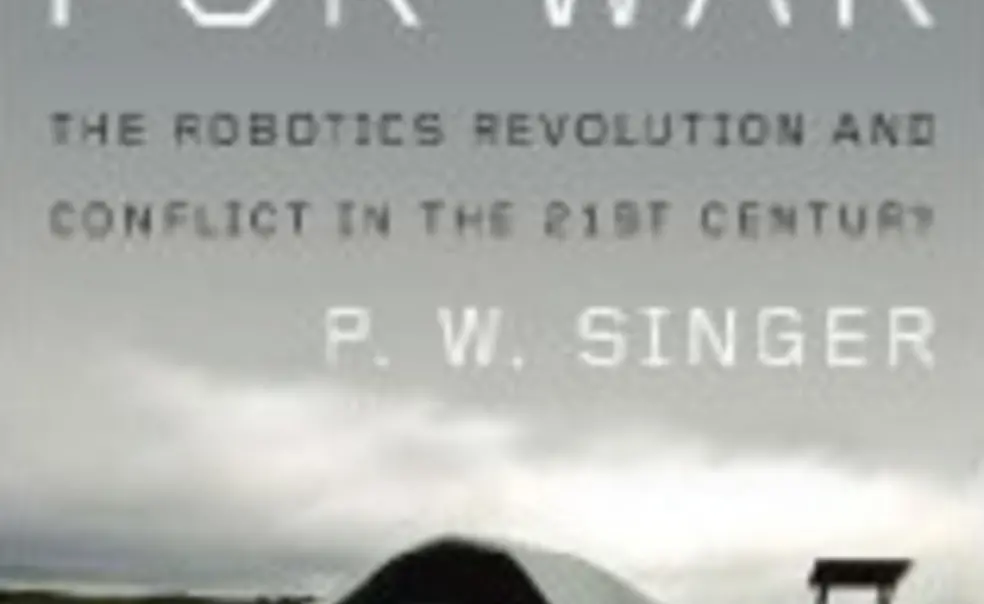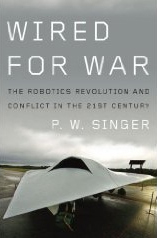Wired for War
Singer ’97 discusses the military's robotics revolution
On the battlefield, robots can save lives by hunting for explosives or supporting troops from the air. And, as one unit in Iraq wrote in a letter of gratitude addressed to the manufacturer of a robot destroyed on a bomb-finding mission, "when a robot dies, you don't have to write a letter to his mother."
But security analyst P.W. Singer ’97 also sees practical and ethical pitfalls in the military's use of robotic technology. In a Feb. 17 lecture at the Woodrow Wilson School, the author of Wired for War: The Robotics Revolution and 21st Century Conflict said that superior technology does not guarantee success (witness the low-tech improvised explosives planted by insurgents in Iraq). Additionally, the chance to outsource fighting to machines may lower the barriers to starting a war.
By increasing the distance between a soldier and his mission, robots are changing the way soldiers view warfare. "This is how one drone pilot described taking out troops from afar: 'It's like a video game,'" Singer said. "Now, as anyone who's played the game Grand Theft Auto knows, there are things that we do in the video world -- in the virtual world -- that we might not do in the real world."
The U.S. military's use of robots in Iraq is widespread, Singer said -- some 7,000 drones in the air and another 12,000 on the ground -- and 43 other nations also are developing robots for combat. Non-state actors like Hezbollah have gained access to the technology as well.
"Terminator"-style humanoid infantrymen may not be as far-fetched as one would imagine. Scientists who have worked with robotics estimate they could be deployed by 2020. That would be a remarkable achievement, Singer admits, but it is an advance driven largely by "our inability to get beyond our need to destroy each other." "So the question is this," Singer said. "Is it us, or is it our machines that are wired for war?"
The Footnotes at 50
The Footnotes, an all-male Princeton a cappella ensemble, celebrated 50 years of making music with a Feb. 21 anniversary concert at Richardson Auditorium that featured special guests from Tufts University -- an all-female group known as the Jackson Jills -- and an alumni sing-along steeped in tradition.
Current Footnote Kevin Moch ’10 said the undergraduate groups performed the bulk of the show, and the "Footnotes Over Fifty," a collection of alumni organized by music director John Preston ’11 and George Bassett ’67, added a few songs in the second half of the concert. "They were a huge hit," Moch told PAW.
At the end of the evening, the Footnotes followed tradition and finished the performance with their signature song, "All I Ask For is You," a Footnotes original. More than 40 alumni in attendance to joined the undergraduates on stage, and to the delight of students and alumni alike, Michael Greenstein ’65 took the solo.
Greenstein, a footnote among Footnotes, composed and arranged "All I Ask For is You."
Pyne Prize winners, by the numbers
When sociology majors Alex Barnard ’09 and Andy Chen ’09 were named co-recipients of the Pyne Honor Prize Feb. 21, it was the first time in recent memory that both winners of the University's top general prize for undergraduates came from the same department.
Fifteen different departments have produced Pyne Prize winners in the last 15 years (28 seniors were honored in that span). The Woodrow Wilson School leads all concentrations with five recipients, followed by English (four) and molecular biology (three). Anthropology, history, and mechanical and aerospace engineering each had two recipients.
The Pyne Prize, established in 1921 and named for Moses Taylor Pyne, Class of 1877, recognizes excellent scholarship, strength of character, and effective leadership by Princeton seniors.
Former museum director recalls looting in Baghdad
When American tanks rolled into Baghdad in April 2003, their arrival signaled the end of Saddam Hussein's regime. The city also entered a period of upheaval that put precious artifacts from Iraq's National Museum at risk. More than 15,000 rare and ancient objects from Mesopotamian history were looted in less than a week, said Donny George Youkhanna, the former director general of the museum, in a lecture at McCormick Hall Feb. 18. Despite the dogged efforts of Youkhanna and others, fewer than 4,000 of the artifacts have been recovered.
The looters were Iraqis, Youkhanna said, and they fit into three categories. One group raided the administration area and took what they knew they could sell, such as computers and fax machines. Another group went into the galleries of the museums and stole large, prominent artifacts. And a third group, which Youkhanna believes had inside knowledge of the museum, went to store rooms and stole precious items from the museum's collection -- "light things, small things, but very precious and valuable things."
In the months and years that followed, some items were returned by Iraqis, and others were discovered by customs agents or in antiquities auctions outside the country. With help from international experts, the museum retrofitted its facilities to discourage future looting. "We had to heighten the fences to three meters, and [add] turning pikes on top," Youkhanna said, showing a slide of the new fence. "To tell you the truth, I do not like it. It looks like a prison. But this is what we had to do."
Youkhanna and his family received death threats and eventually fled Iraq. He was appointed as a visiting professor of anthropology at the State University of New York at Stony Brook.













No responses yet